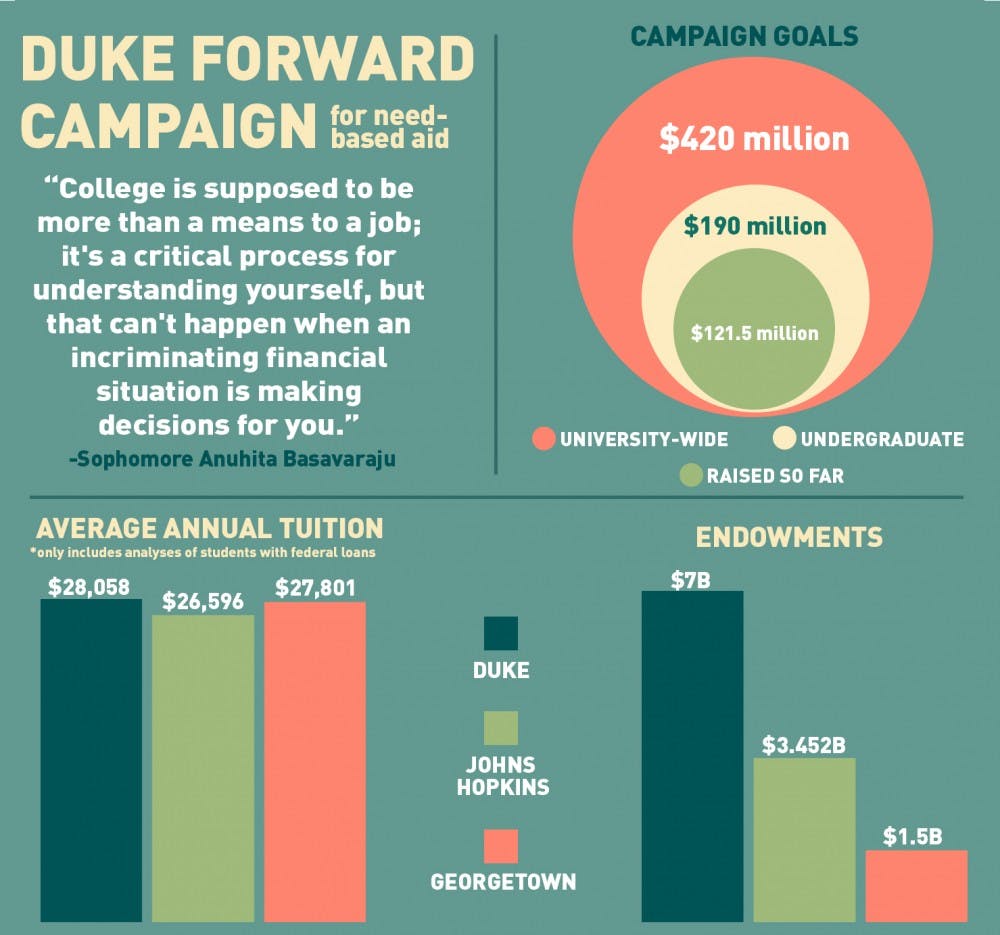Amid concerns about its need-based financial aid, Duke is trying to balance supporting current students and helping prospective ones.
As part of the Duke Forward fundraising initiative, the University is currently conducting a campaign to increase its funding for need-based aid. The goal of the campaign is to raise $190 million in five years for undergraduate need-based aid, said Jim Roberts, executive vice provost for finance and administration. However, he noted that efforts to expand financial aid coverage are limited by the size of Duke’s endowment—currently valued at over $7 billion—and the prospect of removing funds that would otherwise go toward improving the University.
“If we have to use general operating funds, then there is a tradeoff between what we put into financial aid and what we put into the overall academic program, which is the reason people come here in the first place,” Roberts said.
Throughout the past year, several peer universities have announced aid expansions. In April, Stanford University raised the income threshold below which a student’s family is not expected to contribute to the cost of tuition. Last year, the University of Chicago adopted a no-loan policy for its students.
However, Alison Rabil, assistant vice provost and director of financial aid, noted that the University does not have plans to adopt similar policies.
“Until we are in a financial position to expand our award parameters, I don’t believe we will be changing our packages or expanding our awarding policies anytime in the near future,” Rabil wrote in an email.
Roberts noted that financial aid is a major factor in determining a university’s yield rate.
“Financial aid is part of the decision-making process of entering students, so we try to understand whether our aid program is sufficiently supportive so that a student wouldn’t turn us down because of our aid,” he said.
The U.S. Department of Education recently released its College Scorecard, a database that allows prospective students to compare average costs between universities.
Although the Scorecard’s average annual cost calculation has drawn criticism for only including analyses of students who are receiving federal loans, the Scorecard shows that the average annual cost at Duke is slightly higher than peer universities with significantly smaller endowments.
Johns Hopkins, for example, has an endowment valued at $3.452 billion—about half of Duke’s—but boasts a $26,596 average cost compared to Duke’s $28,058. Georgetown University, which has an endowment of about $1.5 billion, has an average annual cost of $27,801.
Many students are calling for Duke to expand its financial aid offerings.
Sophomore Anuhita Basavaraju is a member of the group YOUnite, a student organization that focuses on increasing student political engagement, expanding college access and combating sexual assault. Basavaraju noted that students are better able to reap the benefits of their education when they are confident they will be able to afford it.
“College is supposed to be more than a means to a job; it’s a critical process for understanding yourself, but that can’t happen when an incriminating financial situation is making decisions for you,” Basavaraju wrote in an email.
In comparing financial aid packages with other top-tier institutions, Roberts said that Duke is in a special situation because it offers need-based aid in addition to merit scholarships and athletic aid awards. Although the University is not planning to get rid of existing merit scholarships, Roberts noted that the general consensus among administrators is that no more should be added.
The University will continue its fundraising campaign for need-based aid for the next two years, wrote Sarah West, associate vice president for strategic planning and the Duke Forward campaign, in an email. She said the campaign’s goal is to raise $420 million for financial aid university-wide, with $190 million specifically toward undergraduate need-based financial aid. As of June 30, 2015, about $121.5 million had been raised for this purpose.
"Over the remaining two years of the campaign, we will continue to sustain a deep focus on fundraising efforts for undergraduate need-based support,” she wrote.

